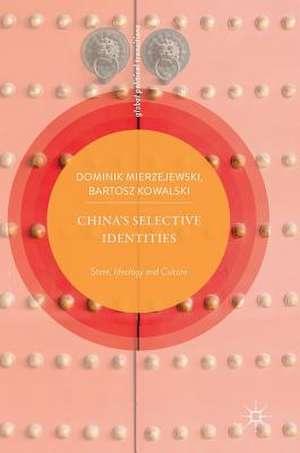China’s Selective Identities: State, Ideology and Culture: Global Political Transitions
Autor Dominik Mierzejewski, Bartosz Kowalskien Limba Engleză Hardback – 22 sep 2018
This book discusses the role of selective identities in shaping China’s position in regional and global affairs. It does so by using the concept of the political transition of power, and argues that by taking on different types of identities—of state, ideology and culture—the Chinese government has adjusted China’s identity to different kinds of audiences. By adopting different kinds of “self”, China has secured its relatively peaceful transition within the existing system and, in the meantime, strengthened its capacity to place its principles within that system. To its immediate neighbors, China presents itself as a state that needs clearcut borders. In relation to the developing world (Global South), the PRC narrates “self” as an ideology with the banner of materialism, equality and justice. To its third “audience”, the developed world (mainly Europe), China presents itself as a peaceful, innocent cultural construct based primarily onConfucius’ passive approach. By bringing these three identities into “one Chinese body” (三位一体, sanwei yiti), China’s policymakers skillfully maneuver and build the country’s position in the arena of global affairs.
| Toate formatele și edițiile | Preț | Express |
|---|---|---|
| Paperback (1) | 386.94 lei 38-44 zile | |
| Springer Nature Singapore – 9 feb 2019 | 386.94 lei 38-44 zile | |
| Hardback (1) | 584.76 lei 6-8 săpt. | |
| Springer Nature Singapore – 22 sep 2018 | 584.76 lei 6-8 săpt. |
Preț: 584.76 lei
Preț vechi: 687.95 lei
-15% Nou
Puncte Express: 877
Preț estimativ în valută:
111.91€ • 121.51$ • 94.00£
111.91€ • 121.51$ • 94.00£
Carte tipărită la comandă
Livrare economică 22 aprilie-06 mai
Preluare comenzi: 021 569.72.76
Specificații
ISBN-13: 9789811301636
ISBN-10: 9811301638
Pagini: 237
Ilustrații: VII, 235 p. 1 illus.
Dimensiuni: 148 x 210 mm
Greutate: 0.44 kg
Ediția:1st ed. 2019
Editura: Springer Nature Singapore
Colecția Palgrave Macmillan
Seria Global Political Transitions
Locul publicării:Singapore, Singapore
ISBN-10: 9811301638
Pagini: 237
Ilustrații: VII, 235 p. 1 illus.
Dimensiuni: 148 x 210 mm
Greutate: 0.44 kg
Ediția:1st ed. 2019
Editura: Springer Nature Singapore
Colecția Palgrave Macmillan
Seria Global Political Transitions
Locul publicării:Singapore, Singapore
Cuprins
1. Introduction: A Theoretical Understanding of China's Selective Identities.- 2. Building China's State Identity: Borders, Institutions, and Conflicts.- 3. Debating China as an Ideology: Marxism, Revolution, and Materialism.- 4. Beyond the Borders: Utopia, Uniqueness, and Soft-Power.- 5. Conclusions.
Notă biografică
Dominik Mierzejewski has a Ph.D. in Humanities and Professorship in Social and Political Science. He is chair at the Center for Asian Affairs, professor at the Department of East Asian Studies, and studied at the Shanghai International Studies University (1999-2000, 2003-2004). He also spent time at the Heritage Foundation (2003), and is a recipient of the Jan Karski Scholarship by the American Center of Polish Culture (2003). He was also a visiting professor at the Chinese Academy of Social Science, granted by the Polish Foundation for Science (2010-2011).
Textul de pe ultima copertă
This book discusses the role of selective identities in shaping China’s position in regional and global affairs. It does so by using the concept of political transition of power, and argues that by taking different types of identities—state, ideology and culture—the Chinese government has adjusted China's identity to different kinds of audiences. By fitting different kinds of "self", China has secured its relatively peaceful transition within the existing system and in the meantime strengthened its capacity to place its principles within the existing system. In the case of its neighborhood, China presents itself as a state with the need of having clear-cut borders. In the case of the developing world (Global South) China narrates “self” as an ideology with the banner of materialism, equality and justice. For the third group of audience, the developed world, mainly Europe, the Chinese presents themselves as a peaceful, innocent cultural construct mainly based on Confucius’ passive approach. By bringing these three identities into "one China's body" [三位一体, sanweiyiti], the Chinese skillfully maneuvers and builds its position in global affairs.
Dominik Mierzejewski has a Ph. D. in Humanities and Professorship in Social and Political Science. He is chair at the Center for Asian Affairs, professor at the Department of East Asian Studies, and studied at the Shanghai International Studies University (1999-2000, 2003-2004). He also spent time at the Heritage Foundation (2003), and is a recipient of the Jan Karski Scholarship by the American Center of Polish Culture (2003). He was also a visiting professor at the Chinese Academy of Social Science, granted by the Polish Foundation for Science (2010-2011).
Bartosz Kowalski works at the Department of East Asian Studies of the University of Lodz, where he teaches modern history and politics of China. His main research activities include China’s state-building policies in the north-western borderlands with his current project focusing on the transfer of Soviet ethnic policies to China’s North-West in the mid-1930s.
Caracteristici
Analyses China's foreign policy behaviour pattern through the lenses of nation-state, ideology and culture Discusses the rationale behind China choosing different types of identities for different types of audiences Offers a fresh take from a Central European perspective














